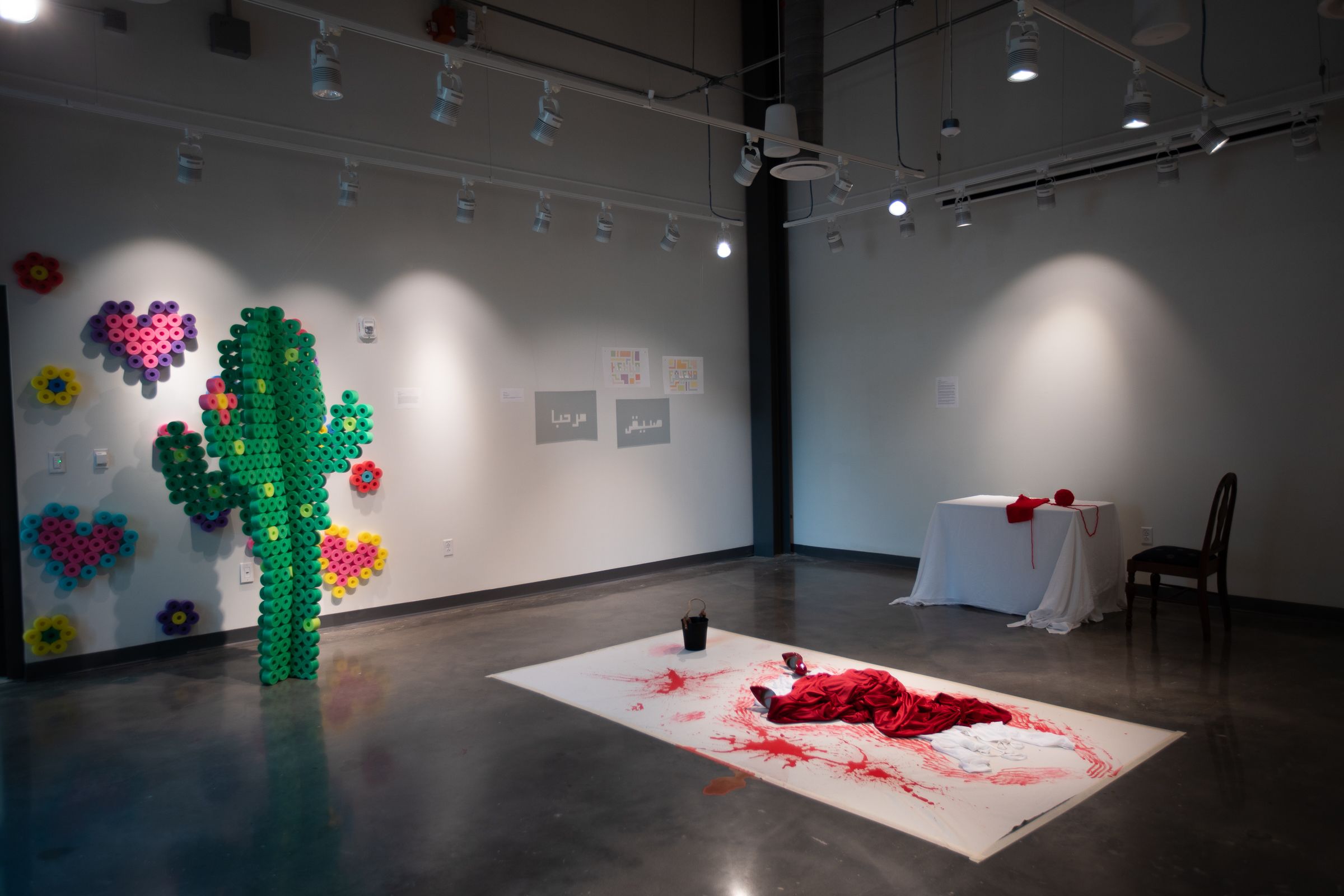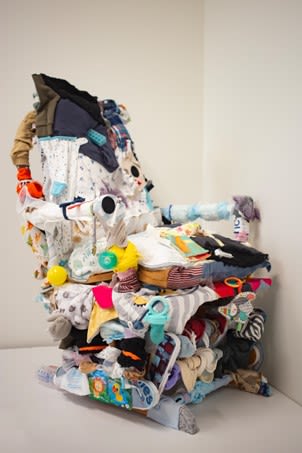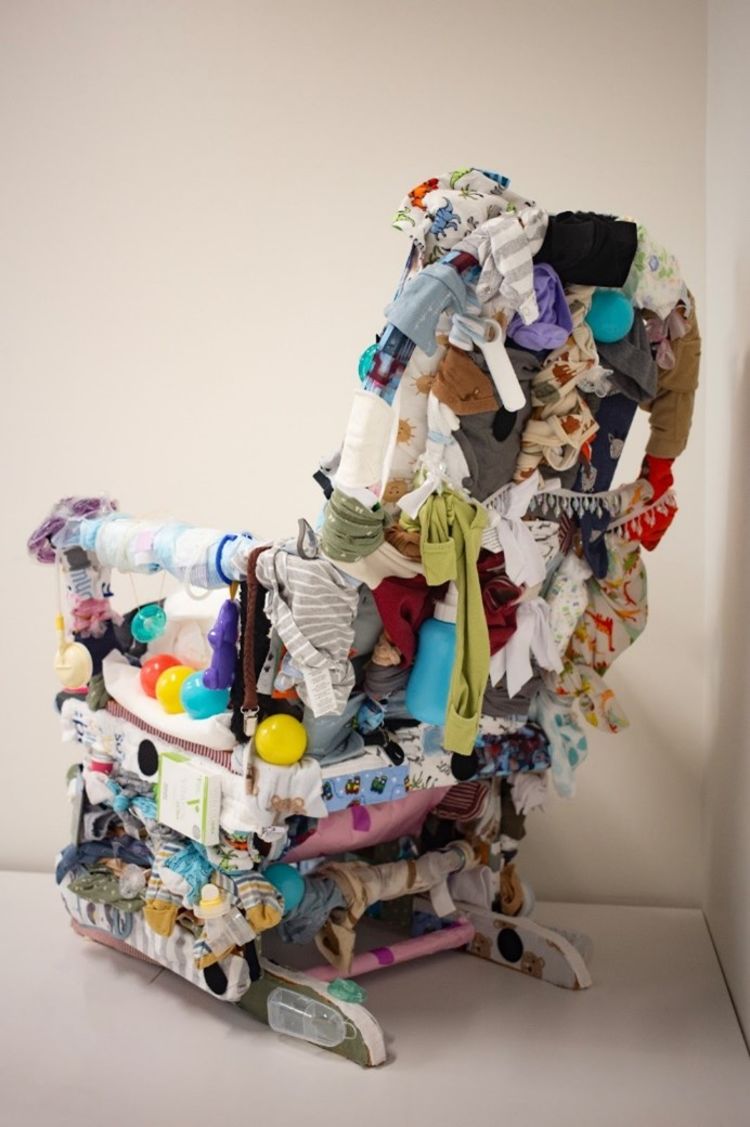Elgin Street Summer Intensive
How MFA Students Build Community Through Art

For two weeks, University of Houston’s Elgin Street Studios Galleries 1 + 2 hosts an exhibit of student work unlike any other. This exhibit is the culmination of a program in the MFA for Fine Arts students called the Elgin Street Summer Intensive (ESS). What’s unique about this intensive is that it was not only founded by two MFA students, but it also remains entirely student driven.
ESS is the brainchild of alumni Liz Gates (’19, MFA ’22) and Doug Welsh (MFA ’22). Gates and Welsh came up with the idea in 2020 when they were MFA students dreading a summer without classes. As they were commiserating over the dearth of artist residencies, Welsh remembers that they asked, “Why not make this experience ourselves?”
“What’s unique about this intensive is that it was not only founded by two MFA students, but it remains entirely student driven.”
Welsh and Gates started with the mission of building a sense of structure and community. They and their fellow MFA students led workshops for one another, sharing their specific skillsets and interests. Welsh taught a class on installation, showing his peers how to install, deinstall, pack and ship their artwork.
Welsh and Gates also wanted to incorporate the Houston arts scene into the intensive. They invited local artists, critics and curators for studio visits with the MFA students in the program. They organized trips to tour museums, artist-run spaces, studios, galleries and non-profit art spaces where they met with curators and gallery owners. Gates explains that these trips are “for networking, but also to fill in some gaps in understanding how the art world works after you leave here.”
These experiences connected current students to the historic presence of the University’s MFA program in Houston’s art scene.
“There’s a long legacy UH MFA artists who stick around Houston and continue to make work and create space for other artists,” Welsh explains. “The work Liz and I have done with ESS continues that history.”
Both Welsh and Gates’s backgrounds prepared them well for such an ambitious undertaking.
Welch co-founded an arts-based collective as an undergraduate student at Bates College in Maine. It was a space where creators of all types — artists, writers, poets, musicians — could bounce ideas off each other and support one another and share their art.
Before Gates came to UH as a non-traditional undergraduate student four years ago, she built and ran an overnight summer camp for girls that taught creative thinking. In her words, “We used the arts as a platform to think creatively, to problem solve and to think outside the box.”
After she was badly burned in an accident, she decided to get a bachelor’s degree and pursue teaching. She lived in Houston with her husband and children, so she needed to find somewhere in the city that offered a strong arts program. “UH was the only choice for me,” she shares. After she started at UH, her trajectory changed again. She fell in love with painting and applied to the MFA program.
Although Gates and Welsh have graduated from the MFA program, they remain integral to the intensive, helping plan and facilitate workshops, guest speakers and trips.
On August 22, the third annual Elgin Street Summer Intensive exhibit debuted. It was titled, "wild things play / play wild things / things play wild," inspired by "Theories of the Wild” by Jack Halberstam, a gender and sexuality scholar. All of the students participating in ESS read this book as a jumping-off point for their discussions and work. The exhibit’s description reads: “Through methods drawn from Halberstam’s radical queer practice and politics, play wild things illuminates and expands the normative taxonomies and neat classifications in favor of fun, unruly and disruptive actions that offer new possibilities for daydreaming, play and revelry.”
Erika Mei Chua Holum, the Cynthia Mitchell Woods assistant curator at the Blaffer Art Museum, curated the show. Invested in the intensive’s mission to prepare students for the more practical elements of a career in the arts, she collaborated with students to best display their works.
L to R: Liz Gates (’19, MFA ’22) and Doug Welsh (MFA ’22) and Erika Mei Chua Holum, the Cynthia Mitchell Woods Assistant Curator
“My approach with each student is saying, ‘You should do more. You should go bigger. You should try something you’ve wanted to try for a long time,’” Holum shares. “I wanted to help them identify what they want to do and then support them as they bring it to life.”
Erika Mei Chua Holum

The result was a dynamic exhibit with a playful bend. It demonstrated the impressive work the MFA students can create with the support of their peers. The ESS intensive has the power to educate, build important connections with the city’s arts scene and culminate in an engaging exhibit.
Most importantly, it has the power to change students’ approach to art, as Gates describes:
“The partnership that Doug and I have developed together has changed my whole understanding of what an art practice is. Community-building and facilitation is absolutely part of my art practice now. It’s pulling in my love of summer camp — facilitating experiences for other people. I never dreamed that would happen in a fine arts setting.”

Maddie Casagranda, Maternal Mindscapes, 2023, Rocking Chair (front). Taken by Jennifer Marion.
Maddie Casagranda, Maternal Mindscapes, 2023, Rocking Chair (front). Taken by Jennifer Marion.

Maddie Casagranda, Maternal Mindscapes, 2023, Rocking Chair (back). Taken by Jennifer Marion.
Maddie Casagranda, Maternal Mindscapes, 2023, Rocking Chair (back). Taken by Jennifer Marion.
